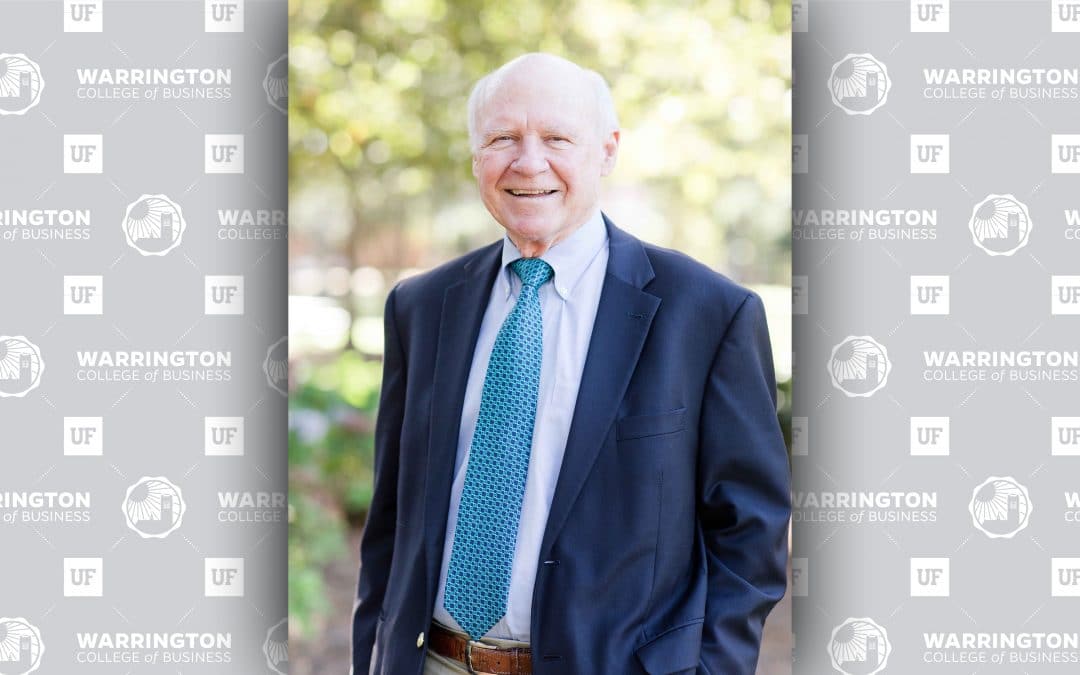The Great Facilitator
How Triple Gator Joe Hair became the No. 1 globally ranked marketing professor for research citations thanks to his University of Florida foundation.
Exactly 50 years ago, in 1971, Joe Hair completed his third and final degree from the University of Florida Warrington College of Business. In the time since, Hair’s passion for marketing and entrepreneurship has propelled him to write more than a dozen books on marketing and become the No. 1 globally ranked marketing professor for research citations.
While the Orlando native didn’t originally think he wanted to follow an academic career path, his family’s recognition of the power of education drove Hair (BSBA ‘66, MS ‘69, Ph.D. ’71) to become a Triple Gator.
“I have to admit, although being a business professor, I hate to do that, but it really wasn’t a plan,” Hair said. “I never really thought about going for a Ph.D. I was mostly interested in studying a field where jobs were available. Although, that didn’t seem to influence it much because I ended up studying psychology and economics!”
While Hair would ultimately earn his undergraduate degree in economics, it was a sales course that sparked his interest in marketing, leading to his subsequent master’s and doctoral degrees in the field.
“[When I was an undergraduate student] I wrote a lot of papers, and it didn’t scare me to think about the fact that I was going to have to write a master’s thesis [in marketing],” he said. “In fact, it was sort of appealing.”
At the end of his master’s degree, Hair was offered what he considered a great sales job with Xerox. He was prepared to accept the $10,000 salary until a more intriguing offer came from then-department chair in marketing Don Butterworth. The college had recently received funds for a fellowship from the U.S. Steel Foundation, and Butterworth wanted Hair to be the recipient so he could pursue a Ph.D. in marketing.
Hair decided to take up Butterworth’s offer, and the rest, as they say, is history. During his Ph.D. studies, a new focus on research had come to UF, and Hair was asked to use statistics, specifically the concept of multivariate data analysis, in his work.
Multivariate data analysis is a concept that refers to all statistical methods that simultaneously analyze multiple measurements on each individual respondent or object under investigation. While Hair hadn’t previously had much of a background in statistics, it was this concept that he would, quite literally, write the book on.
“[During my Ph.D. studies,] All of a sudden, we had to learn stats that we had never been taught,” Hair said. “You know, it basically changed my life.”
In the time since Multivariate Data Analysis was first published in 1979, it has been cited more the 110,000 times and is one of the top five all time social sciences research methods textbooks.
Hair’s collection of books also includes, Marketing, Essentials of Business Research Methods, Essentials of Marketing Research, and A Primer on Partial Least Squares Structural Equation Modeling, plus many others, rounding out his authorship to 14 unique textbooks, with all but two of them still in print.
His most recent book, Essentials of Marketing Analytics, capitalizes on the growth of analytics in business and its role in helping companies make strategic decisions.
“I seized the opportunity there,” Hair said. “Marketing analytics, analytics, data analytics in general, it’s a short step away from the multivariate data analysis which we applied primarily to data collected [via] surveys, whereas we’re talking about big data today, and you need techniques that are quite similar but are able to be enhanced by artificial intelligence.”
While Hair has authored plenty of books himself, he’s most proud of a book that he played a very different role in creating. The Great Facilitator: Reflections on the Contributions of Joseph F. Hair, Jr. to Marketing and Business Research, written by Hair’s former students and colleagues, chronicles the impact Hair has made on individuals throughout his career in academia.
“[My former students and colleagues] labeled me The Great Facilitator because I’ve always been working to coauthor with people and help them learn methods and applying the methods,” Hair said. “I’d have to say, [receiving the book] is really my proudest [career] moment.”
In addition to his books, Hair’s entrepreneurial spirit helped develop new doctoral programs at both his former and current institutions. While at Kennesaw State University, Hair created a Ph.D. program specifically for working professionals who could work towards their degree through in-person weekend classes. In 2016, the program earned an Innovations that Inspire Award from the Association to Advance Collegiate Schools of Business (AACSB).
It was this program that caught the eye of his current institution, the University of South Alabama, which asked him to join the faculty and create a similar program. Hair serves as director of South Alabama’s Ph.D. program in business, which he has expanded to offer tracks in marketing, management and business analytics.
Over the years, Hair has gained valuable insights about how to have a prolific academic career. Hair suggests that having a passion for learning is significant, as is understanding the need for balance.
“We need to share with young people that you can’t work all the time,” Hair said. “You need to have things that take you away from your work that enable you to reflect and think and then refresh yourself and move back into the mainstream aspect of your career.”
These two suggestions, though, Hair notes, are second and third to one thing – education in a strong program that will build your foundation. For Hair, the University of Florida was the foundation that gave him the opportunity to have tremendous success.
“I owe a lot to my degree at the University of Florida because that’s where I learned about marketing,” he said. “It taught me how to execute and to apply marketing concepts, and my career is based upon doing that. If I hadn’t had a strong foundation in marketing that the University of Florida gave to me, at the master’s and Ph.D. level, I would never be where I am today.”




